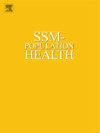Association between family economic decision-making power and survival outcomes among older adults in China: A population-based longitudinal study
IF 3.6
2区 医学
Q1 PUBLIC, ENVIRONMENTAL & OCCUPATIONAL HEALTH
引用次数: 0
Abstract
Objective
This study examines the association between family economic decision-making power and survival outcomes among older adults.
Methods
Data were drawn from the China Longitudinal Healthy Longevity Survey (CLHLS) from 2005 to 2018. Family economic decision-making power was assessed based on participants’ self-reported influence over household financial matters, categorized as: “making decisions on almost all household expenditures”, “deciding on non-essential spending”, “only deciding on personal expenditures”, and “having no decision-making power over household spending”. Survival status and date of death were determined through interviews with close family members during each survey round. Cox proportional hazards regression models were used to analyze the relationship between family economic decision-making authority and survival outcomes among older adults using longitudinal follow-up data. Subgroup analyses were conducted to identify vulnerable populations.
Results
The study included 10,443 older adults, of whom 5606 (53.68%) died during the follow-up period, with a median survival time of 7 years. Compared to those with full decision-making authority, the hazard ratios (95% CI) were 1.02 (0.87–1.20) for those with authority over non-essential spending, 1.22 (1.07–1.38) for those with authority over personal spending, and 1.24 (1.04–1.47) for those with no decision-making power. The impact of low decision-making authority on survival was modified by factors such as gender, occupation before age 60, household economic status, experience of child loss, and physical labor.
Conclusions
Low family economic decision-making power is associated with an increased risk of mortality. Promoting active participation in financial decisions may enhance health outcomes. However, the study is limited by its focus on Chinese data, challenges in establishing causal relationships, and the measurement of decision-making power at a single point in time.

中国老年人家庭经济决策权与生存结果的关系:一项基于人群的纵向研究。
目的:本研究探讨家庭经济决策权与老年人生存结局的关系。方法:数据来自2005 - 2018年中国纵向健康寿命调查(CLHLS)。家庭经济决策权是根据参与者自我报告的对家庭财务事务的影响来评估的,分为:“决定几乎所有家庭支出”、“决定非必要支出”、“只决定个人支出”和“对家庭支出没有决策权”。在每一轮调查中,通过与亲密家庭成员的访谈确定生存状况和死亡日期。采用Cox比例风险回归模型,采用纵向随访资料分析老年人家庭经济决策权与生存结局的关系。进行亚组分析以确定弱势群体。结果:研究纳入10443名老年人,其中5606人(53.68%)在随访期间死亡,中位生存时间为7年。与拥有完全决策权的人相比,对非必要支出有决策权的人的风险比(95% CI)为1.02(0.87-1.20),对个人支出有决策权的人的风险比为1.22(1.07-1.38),而对没有决策权的人的风险比为1.24(1.04-1.47)。低决策权对生存的影响受性别、60岁前职业、家庭经济状况、丧子经历和体力劳动等因素的影响。结论:低家庭经济决策权与死亡风险增加有关。促进积极参与财务决策可改善健康结果。然而,该研究的局限性在于其对中国数据的关注,建立因果关系的挑战,以及在单一时间点上对决策权的衡量。
本文章由计算机程序翻译,如有差异,请以英文原文为准。
求助全文
约1分钟内获得全文
求助全文
来源期刊

Ssm-Population Health
PUBLIC, ENVIRONMENTAL & OCCUPATIONAL HEALTH-
CiteScore
6.50
自引率
2.10%
发文量
298
审稿时长
101 days
期刊介绍:
SSM - Population Health. The new online only, open access, peer reviewed journal in all areas relating Social Science research to population health. SSM - Population Health shares the same Editors-in Chief and general approach to manuscripts as its sister journal, Social Science & Medicine. The journal takes a broad approach to the field especially welcoming interdisciplinary papers from across the Social Sciences and allied areas. SSM - Population Health offers an alternative outlet for work which might not be considered, or is classed as ''out of scope'' elsewhere, and prioritizes fast peer review and publication to the benefit of authors and readers. The journal welcomes all types of paper from traditional primary research articles, replication studies, short communications, methodological studies, instrument validation, opinion pieces, literature reviews, etc. SSM - Population Health also offers the opportunity to publish special issues or sections to reflect current interest and research in topical or developing areas. The journal fully supports authors wanting to present their research in an innovative fashion though the use of multimedia formats.
 求助内容:
求助内容: 应助结果提醒方式:
应助结果提醒方式:


